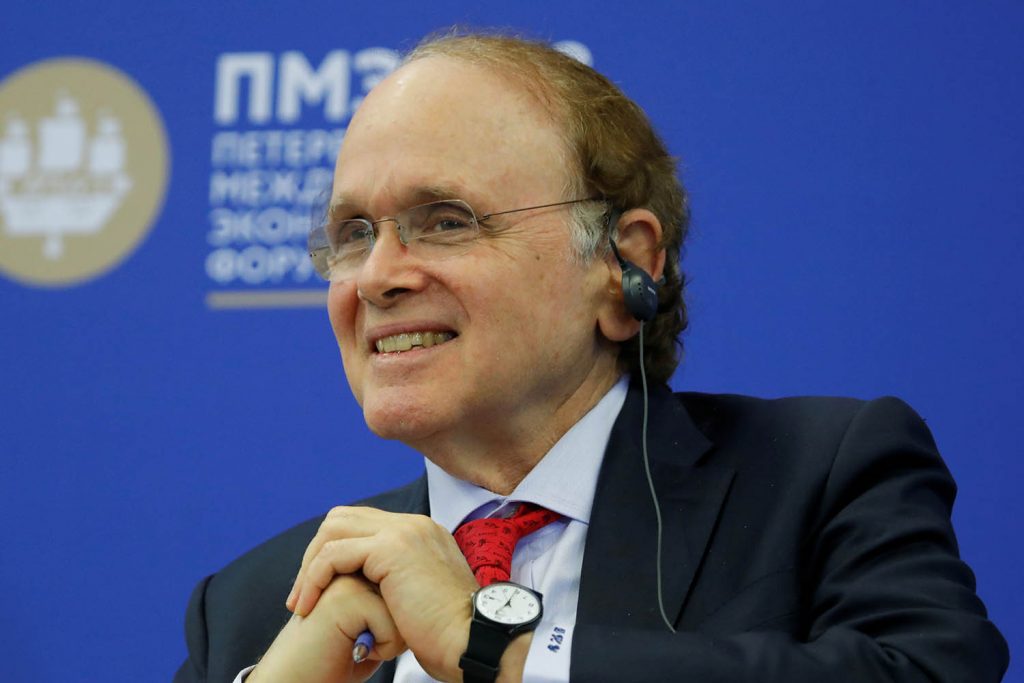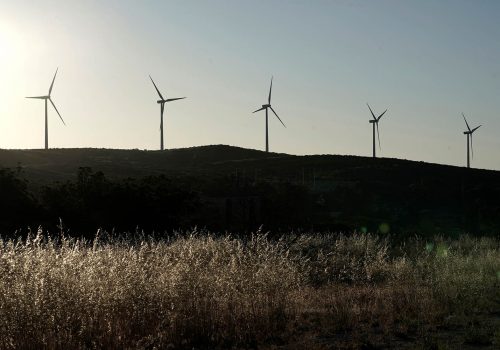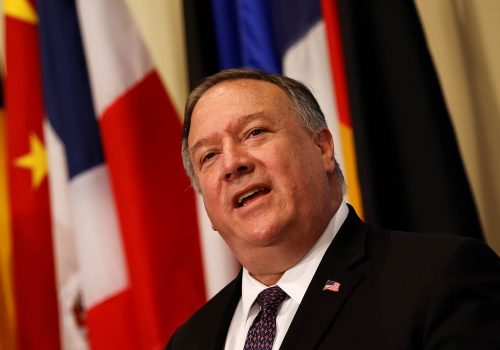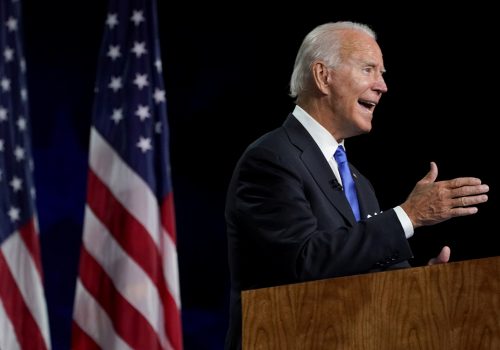Russian President Vladimir Putin and Chinese President Xi Jinping “are cooking something up—and I think it goes beyond blinis,” says the Pulitzer Prize-winning energy expert Daniel Yergin, referring to the time when the two leaders took a break from an economic forum in Vladivostok to make the Russian pancakes.
The balance of power in the global oil market today is no longer “OPEC versus non-OPEC,” argued Yergin, who spoke at an Atlantic Council Front Page event on September 25 about his new book The New Map: Energy, Climate, and the Clash of Nations. “It’s the big three: the United States, Russia, and China, and how they interact with each other.”
Here are some highlights of what Yergin said about Russian and Chinese influence in the energy sector, energy’s impact on American leadership abroad, and where the energy transition appears to be heading.
There’s “energy” in the Sino-Russian relationship
- An oil-based attraction: The bond between China and Russia, once based on communist ideology, “is significantly grounded today in oil and gas,” Yergin said, becoming especially close as Russia became a critical exporter of gas to China.
- The enemy of my enemy is my friend: As US relations with China and Russia have grown “more difficult and truculent,” China and Russia have drawn closer, Yergin added. Around the same time that the US imposed sanctions on Nord Stream II, a gas-pipeline project connecting Germany and Russia, Putin and Xi hosted an elaborate ceremony to send Russian gas into China. The Chinese were also “allowed to invest in Russian [liquified natural gas] projects in the Arctic,” which “had not happened before.”
- Nord Stream II’s future: The poisoning of Russian opposition leader Alexei Navalny could potentially jeopardize the Nord Stream II project by changing German attitudes toward it, Yergin observed. But whether through Nord Stream II or not, “Russian gas is going to go to Europe” as it currently makes up about 35 percent of Europe’s gas and 10 percent of its total energy, according to Yergin.
- The next energy investors: Investor appetite in the energy sector is declining quickly due to the rise of environmental, social, and governance (ESG) criteria, designed to measure the sustainability and societal impact of investments in companies, along with dropping oil and gas prices. Yergin predicted that significant investments will be needed to support the oil sector over the next few years and that these may come from countries such as China and India. “There’ll be a shift in ownership within the global [energy] industry,” he said.
Watch the full event with Daniel Yergin:
How energy influences America’s role in the world
- Shale fuels US flexibility: By lessening US dependence on imported oil and increasing its domestic oil supply, the shale revolution has provided “a flexibility to US foreign policy and a dimension of influence” that wasn’t possible when the United States imported 60 percent of its oil Yergin noted. This newfound energy independence, he said, enabled the United States to use sanctions to force Iran into nuclear negotiations and to instill some fear into Russia’s Gazprom by exporting natural gas across Europe.
- UAE, Bahrain deals with Israel have an “energy side” too: The shale revolution may also be a factor in the recent normalization deals between Israel, the United Arab Emirates, and Bahrain, Yergin argued. There was a sense, even before the Trump administration, that the “US would just lose interest in” the Middle East as it became more self-sufficient when it comes to oil, Yergin explained. Gulf countries concerned with Iran sought to “form a stronger relationship with a very strong regional power,” and thus turned their sights on Israel.
- Climate and a “clash of nations”: The next US administration will have to cross over “a lot of land mines” in navigating the relationship between China and Russia, Yergin said. It will also have to consider the United States’ role in efforts to combat climate change, which is going to be a “big central question” because “we’re seeing a big clash of nations” over climate issues, and “navigating our way through it… is going to be a very important aspect of statecraft in the years ahead.”
Shaping the energy transition: net-zero carbon goals
- Missing technology: The key to reaching net-zero carbon emissions by 2050 is technology, says Yergin. Citing a report he led with former US Energy Secretary Ernest Moniz and the Breakthrough Energy Coalition, a group spearheaded by Bill Gates, Yergin said that the technologies needed to achieve the goal still don’t exist. “That’s why the basic science, the research part of this, is so important,” he explained.
- A dark moment on the way to a brighter future? The pandemic is changing energy demand, which presents opportunities for working toward net-zero carbon goals, said Yergin, including an opening to “build back better green investment” in struggling sectors.
- Regulation only gets you so far: Yergin expressed skepticism about some efforts to achieve net-zero carbon emissions by 2050, including the European Union’s Green Deal, which he maintained may push too hard and quickly for results while sacrificing economic growth. “You can try to move there with regulation,” he said, but doing so will require rebuilding the economy. With governments reeling from debt due to the coronavirus pandemic, Yergin doubted they’ll have the resources to expedite the energy transition and predicted a “clash between environment ministers and finance ministers.”
- The role of emerging markets: Given coal energy has evolved over two hundred years, 2050 isn’t “very far away,” Yergin noted. Certain emerging markets such as India and Nigeria are focused on reducing the indoor air pollution that afflicts about three billion people in the world, which some argue requires switching from “traditional fuel” sources to “natural gas.” Russia and China, meanwhile, are “leaders in selling nuclear-power technology to emerging markets,” Yergin noted, and on the path to net-zero carbon emissions “nuclear has to play a role in order to achieve those objectives.”
Katherine Walla is assistant director of editorial at the Atlantic Council.
Further reading:
Image: Daniel Yergin, an energy historian and vice chairman of IHS Markit, attends a session of the St. Petersburg International Economic Forum (SPIEF), Russia May 25, 2018. REUTERS/Sergei Karpukhin



